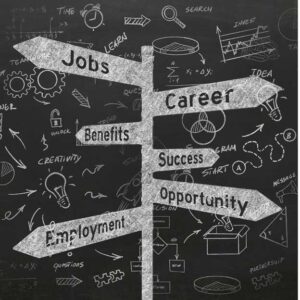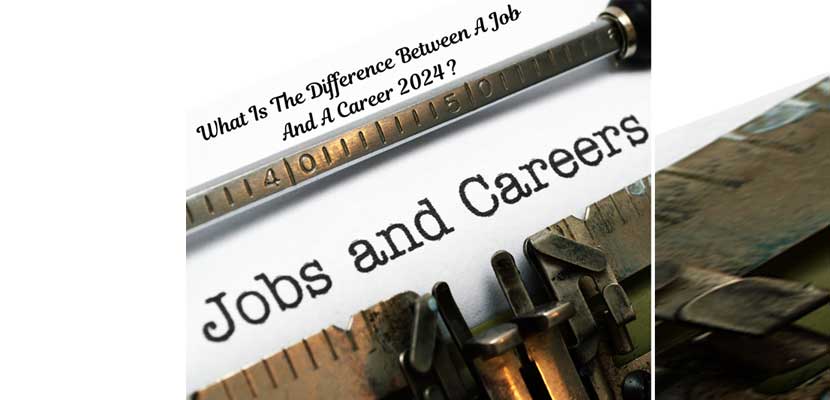Job and Career Difference | Explained
Knowing the distinction between jobs and careers is vital to making educated decisions regarding your career. While many refer to these terms interchangeably, they are distinct concepts that affect your overall satisfaction and growth. The term “job” is often used to refer to an occupation or job that you are temporarily employed for earning money, which focuses predominantly on the immediate requirements.
A career is a set of interconnected jobs that aid in your professional growth and development, giving you the sense of purpose and longer-term growth. This blog will discuss the differences between jobs and careers by exploring how understanding this distinction could impact your decisions and allow you to ensure that your career choices are in line to your personal goals.
Job and Career Difference | Comparison
Understanding the distinction between the two is essential to the direction you take in your professional experience. Here are 12 points that demonstrate these distinctions as well as their implications:
1. Short-term vs Long-term Perspective
The majority of jobs are focused on the short-term, such as making a profit or getting instant knowledge. It’s typically filled to fulfill a need. A career requires long-term planning, and is a course that you choose to follow, with an emphasis on development as well as learning and advancement throughout the years. Understanding the distinction between a job and a job will help you plan your next steps in a way that is efficient.
2. Purpose and Passion
Many jobs are designed to meet the immediate financial requirements or demands, without necessarily aligning with your passions or interests. On the other hand your career is motivated by an increased feeling of purpose and enthusiasm when the work you do is in alignment with your interests and values and leads to greater satisfaction for yourself.
3. Skill Development
Work requires specific skills to perform certain jobs, and there are few opportunities to develop your skills. A career is a continuous process of enhancing your skills and each job builds on the previous one, enhancing your overall expertise in the field.
4. Job Satisfaction vs Career Fulfillment
It is often dependent on immediate pay as well as work-life balance, workplace environment, and working-life balance. However, fulfillment in the workplace is more comprehensive, encompasses personal development, achieving long-term goals, as well as the feeling of contributing to a larger cause.
5. Stability vs Growth
The jobs are more sporadic and subject to frequently changing jobs based on the economic environment or personal situations. A career can provide greater stability because it’s developed through time. every job assisting in long-term professional advancement and safety.
6. Responsibility and Commitment
A job typically involves executing specific duties that are confined to the job you’re being hired to fill. A job requires a greater level of commitment because it is a continual learning experience, changing to changes in a specific area.

7. Financial Focus vs Personal Development
The primary goal of a job is usually financial as a pay check is being the main goal. However, a career puts a lot of emphasis on professional and personal development and financial rewards, which are complemented by growth and satisfaction.
8. Temporary vs Permanent
The work can be temporary, especially part-time and contracts, which are employed as an interim or filler between permanent positions. A career is a stable and consistent path that has distinct timeline and milestones which can span several decades.
9. Networking and Professional Relationships
Some jobs may require networking that is specific to your current job or your company. When you are in a professional setting networking, it’s an ongoing and strategic endeavor focussed on establishing professional connections that will help your development, offer mentorship and provide opportunities for the future.
10. Learning Opportunities
Some jobs offer only some learning opportunities that are limited to specific roles or tasks. However, a career is an ongoing learning process in which every job, task and experience enriches your knowledge base and experience.
11. Motivation
The motivation for a job could be triggered by external factors, such as pay or bonuses, or even the security of your job. In a professional setting the motivation of a person is usually inbuilt, fueled from the need to accomplish long-term goals, create an impact and pursue your own interest.
12. Legacy and Impact
The job may not have an impact that lasts beyond the time you are employed. A successful career lets you create an impact, make a difference in your field, make an impact on others and leave an impression that lasts long after your time in any specific position.
Aspect
- Job
- Career
- Perspective
- Goals that are immediate and short-term.
- Long-term with a focus on advancement and growth
- Purpose
- Financial needs are met, but is not in line with passion
- Aims for excellence, is in alignment with values and desires
- Skill Development
- Limited skill enhancement, task-specific
- Continuous skill enhancement, building expertise
- Satisfaction vs Fulfillment
- The satisfaction of the salary and environment.
- Attainment of growth goals, reaching long-term objectives
- Stability vs Growth
- Changeable, transient
- Stable, assisting in the long-term growth of professionals.
- Responsibility
- Assuming the specific responsibilities of a particular role
- Demands more commitment, continual learning and adaption
- Focus
- Primarily, it is financial
- Focus on personal development and financial benefits
- Duration
- Most often, they are temporary or part-time.
- Permanent, structured and with a clearly defined course
- Networking
- Current role is limited or company
- Long-term, strategic relationships that will bring expansion and new opportunities
- Learning Opportunities
- Limited, task-specific
- Continuous learning and enhancement of skills
- Motivation
- External factors like salary or bonuses.
- Passionate driven by passion and long-term goals
- Legacy
- Minimal impact beyond employment duration
- Creates a legacy and has lasting impact on the field
Which to choose?
In weighing a career option vs an employment opportunity, it is crucial to take into consideration your future goals. If your financial situation is urgent, a job could be required. But, if you’re looking for an increase in your personal satisfaction, long-term growth and the chance to have a lasting impression, then focusing on the development of an established career is the ideal choice.
Affiliating your choices to your goals and passions can help you attain the stability of your finances and also personal satisfaction in the long run.
Additionally, you should consider registering for management classes to keep up with the times. These courses will equip you with the latest skills and make your career more fluid and geared to the demands of the future in your industry.

Conclusion
Knowing the distinction between jobs and careers is essential to make informed decisions regarding your professional path. An employment opportunity may meet the immediate requirements, however making a career choice aligns your career path with your longer-term goals and desires.
Understanding this career and job differentiator allows you to create an approach that will allow both professional and personal development, making sure that your work isn’t only a means of an end but a satisfying experience that will shape your future. Visit Our Website.

